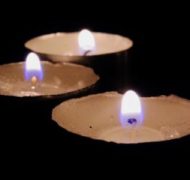Best of Daily Reflections: How Should We Expose the Deeds of Darkness? Part 1
Daily Reflection / Produced by The High Calling
"...It is shameful even to mention what the disobedient do in secret. But everything exposed by the light becomes visible—and everything that is illuminated becomes a light. This is why it is said: "Wake up, sleeper, rise from the dead, and Christ will shine on you."
Ephesians 5:11-14
As we saw in yesterday's reflection, Ephesians 5:11 does not urge us to remove ourselves completely from "the fruitless deeds of darkness" and those who do them. Rather, it teaches us not to participate in these deeds or to become partners in wrongdoing. In fact, we are to have something to do with "the fruitless deeds of darkness." We are to "expose them."
Several questions suggest themselves in response to this imperative: What does it mean to expose the deeds of darkness? How should we do this? Which dark deeds deserve our attention? Those of the world? Those done by fellow believers?
In today's reflection, I want to focus on the latter questions. Before we consider how we should expose the deeds of darkness, we had better determine which deeds deserve our attention. Commentators on this passage differ in their interpretation of this verse. Some believe that the deeds we should expose are those done by our fellow believers. After all, we are to "speak truthfully" to our fellow Christians, which includes, at times, exposing their sinful behavior so they might repent (4:25; see also Matt. 18:15-17; Gal. 6:1). This could be what Ephesians 5:11 envisions.
But, I am persuaded by the text and its context that this verse invites us to expose the deeds of darkness done primarily by those who are not Christians. (By analogy, we might also expose the sins of our brothers and sisters in Christ, but this is not the main point of verse 11.) In Ephesians, darkness is associated with Gentile thought and action. In 4:17-18, we are no longer to "live as the Gentiles do, in the futility of their thinking. They are darkened in their understanding." Moreover, we were "once darkness" before we became "light in the Lord" (5:8). Thus, our battle is primarily against "the powers of this dark world," not the shadows of darkness that remain in the church (6:12). It seems clear to me that the deeds of darkness we are to expose are those done by people outside of Christ.
If this is true, how are we to do this? Are Christians to become the beacons of morality in our world, those who point out all of the sins of those who are not Christians? I'll take up this question tomorrow. For now, let me encourage you to wrestle with this text so that you might discover what God is saying to you through it.
QUESTIONS FOR FURTHER REFLECTION: When you read that you are to expose the fruitless deeds of darkness, how do you respond? What do you think? What do you feel? Is this a task you look forward to doing? Or is this something you'd rather avoid? How, do you think, does God want you to expose the fruitless deeds of darkness in the world?
PRAYER: Gracious God, I must admit that the verse we are studying makes me rather nervous. I'm not sure I like the idea of exposing the fruitless deeds of darkness. I'm so aware of the darkness that remains in my life. Who am I to expose anything in the lives of others? And the last thing I want to do is to become one of those Christians who majors in telling others their sins and railing against the world. Yet, I receive your Word as truth. So help me, I pray, to know what you are saying to me and to your church through this verse. Teach me how I can "have nothing to do with the fruitless deeds of darkness, but rather expose them." Amen.
Rethinking Scarcity
We all know the pinch of limited resources. Whether it's a crunch for time, a shrinking bank account, or a competitive workplace, we often experience life dissatisfied and craving more. At The High Calling, we are Rethinking Scarcity, attempting to understand how both real and perceived scarcity influences our thoughts and behaviors. We also will explore scarcity’s influence in our decisions and how reimagining constraints not only changes the way we respond to our circumstances, but ultimately may change our circumstances themselves. Join us for the conversation!











